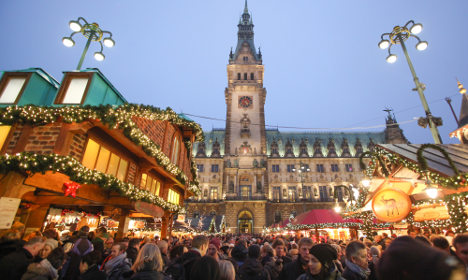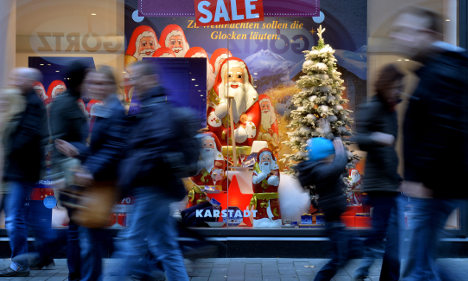6 ways Germany cashes in at Christmastime

It's not just children who rejoice over all the presents, Lebkuchen and Advent calendars bought this time of year. These six numbers show just how much cash Germany rakes in during the season of giving.
Up to €2.5 billion spent at Christmas markets
 Hamburg Christmas market. Photo: DPA.
Hamburg Christmas market. Photo: DPA.
Christmas markets are a multi-billion-euro industry and for many merchants, they are the most important source of revenue for the year.
"Depending on the industry, they make between 30 and 50 percent of their annual sales" at Christmas markets, said Hans-Peter Arens, president of the Federal Association of Fairground Showmen and Market Traders.
In total, Christmas market visitors spend about €1.8 billion on food, drinks and shopping, according to the association.
But another survey by the market research firm Centre for Retail Research suggests that Christmas markets made nearly €2.5 billion in 2014.
However, some vendors worry that this year fewer people will visit the markets because of fear of a new terrorist attack after last week's rampage in Paris.
23 million Christmas trees
 Photo: DPA.
Photo: DPA.
Businesses are expecting a fall-off in the tree business this year. There is an oversupply of the Christmas topiary this year, leading prices to drop, according to Christmas tree producers in Sauerland.
They predict €10 million less in sales.
Last year about 23 million Christmas trees were sold, according to the Association of Christmas Tree Producers.
But this total was 1.5 percent less than 2013.
A tree costs between €8 and €22 per meter of height, depending on the type.
146 million chocolate Santas
 Photo: DPA.
Photo: DPA.
Whether it's Advent calendars, chocolate Santas or marzipan, "Christmastime is the most important time of year," according to the Association of the Confectionery Industry.
In 2014, 146 million chocolate Santas alone were produced. In fact, the world's biggest chocolate producers are in Germany, according to the confectionery association.
93,000 tons of baked goods
 Photo: DPA.
Photo: DPA.
Last year, German producers pumped out 92,640 tons of seasonal baked goods, of which Lebkuchen was the most in demand at 38 percent of sales, according to market research firm Nielsen.
Lebkuchen is a traditional German holiday treat similar to gingerbread.
But don't forget about all the other Christmas-y treats that Germany has to offer. Spekulatius - a sweet, spiced biscuit - was second most popular last year, followed by Stollen (a cake, often with dried fruit) and Dominosteinen (cubed sweets with layers of Lebkuchen and other fillings, covered in chocolate).
The biggest producer of the Christmas goodies is Lambertz in Aachen, west Germany. Though the company does not release exact details on profits or amount sold, last Christmas season they reported a sales increase of 2.5 percent.
The market for Lebkuchen - which is slightly more expensive than other baked Christmas treats - has stagnated recently, though at a high level of sales.
40 percent of toy sales made during Christmastime
 Photo: DPA.
Photo: DPA.
Toy stores make 40 percent of their sales during Christmastime, according to the Association of Toy Stores.
As the beginning of the season kicks off, toy sellers are optimistic because business has been going quite well in the past few months, according to industry members.
€87 billion in retail
 Photo: DPA.
Photo: DPA.
Shopping in general during the holidays is quite high as shoppers dash around looking for deals on scarves, sweaters and other gifts for their loved ones - and for themselves.
Retailers this year expect revenues in November and December to reach €86.7 billion.
So get your wallets ready - Germany awaits your Christmas contributions.
Comments
See Also
Up to €2.5 billion spent at Christmas markets
 Hamburg Christmas market. Photo: DPA.
Hamburg Christmas market. Photo: DPA.
Christmas markets are a multi-billion-euro industry and for many merchants, they are the most important source of revenue for the year.
"Depending on the industry, they make between 30 and 50 percent of their annual sales" at Christmas markets, said Hans-Peter Arens, president of the Federal Association of Fairground Showmen and Market Traders.
In total, Christmas market visitors spend about €1.8 billion on food, drinks and shopping, according to the association.
But another survey by the market research firm Centre for Retail Research suggests that Christmas markets made nearly €2.5 billion in 2014.
However, some vendors worry that this year fewer people will visit the markets because of fear of a new terrorist attack after last week's rampage in Paris.
23 million Christmas trees
 Photo: DPA.
Photo: DPA.
Businesses are expecting a fall-off in the tree business this year. There is an oversupply of the Christmas topiary this year, leading prices to drop, according to Christmas tree producers in Sauerland.
They predict €10 million less in sales.
Last year about 23 million Christmas trees were sold, according to the Association of Christmas Tree Producers.
But this total was 1.5 percent less than 2013.
A tree costs between €8 and €22 per meter of height, depending on the type.
146 million chocolate Santas
 Photo: DPA.
Photo: DPA.
Whether it's Advent calendars, chocolate Santas or marzipan, "Christmastime is the most important time of year," according to the Association of the Confectionery Industry.
In 2014, 146 million chocolate Santas alone were produced. In fact, the world's biggest chocolate producers are in Germany, according to the confectionery association.
93,000 tons of baked goods
 Photo: DPA.
Photo: DPA.
Last year, German producers pumped out 92,640 tons of seasonal baked goods, of which Lebkuchen was the most in demand at 38 percent of sales, according to market research firm Nielsen.
Lebkuchen is a traditional German holiday treat similar to gingerbread.
But don't forget about all the other Christmas-y treats that Germany has to offer. Spekulatius - a sweet, spiced biscuit - was second most popular last year, followed by Stollen (a cake, often with dried fruit) and Dominosteinen (cubed sweets with layers of Lebkuchen and other fillings, covered in chocolate).
The biggest producer of the Christmas goodies is Lambertz in Aachen, west Germany. Though the company does not release exact details on profits or amount sold, last Christmas season they reported a sales increase of 2.5 percent.
The market for Lebkuchen - which is slightly more expensive than other baked Christmas treats - has stagnated recently, though at a high level of sales.
40 percent of toy sales made during Christmastime
 Photo: DPA.
Photo: DPA.
Toy stores make 40 percent of their sales during Christmastime, according to the Association of Toy Stores.
As the beginning of the season kicks off, toy sellers are optimistic because business has been going quite well in the past few months, according to industry members.
€87 billion in retail
 Photo: DPA.
Photo: DPA.
Shopping in general during the holidays is quite high as shoppers dash around looking for deals on scarves, sweaters and other gifts for their loved ones - and for themselves.
Retailers this year expect revenues in November and December to reach €86.7 billion.
So get your wallets ready - Germany awaits your Christmas contributions.
Join the conversation in our comments section below. Share your own views and experience and if you have a question or suggestion for our journalists then email us at [email protected].
Please keep comments civil, constructive and on topic – and make sure to read our terms of use before getting involved.
Please log in here to leave a comment.